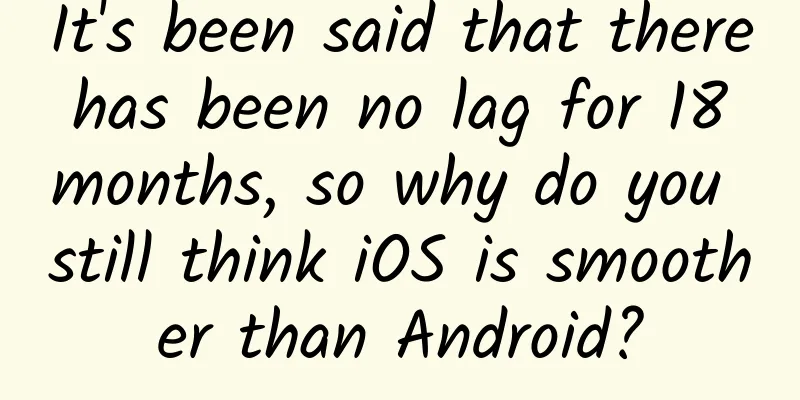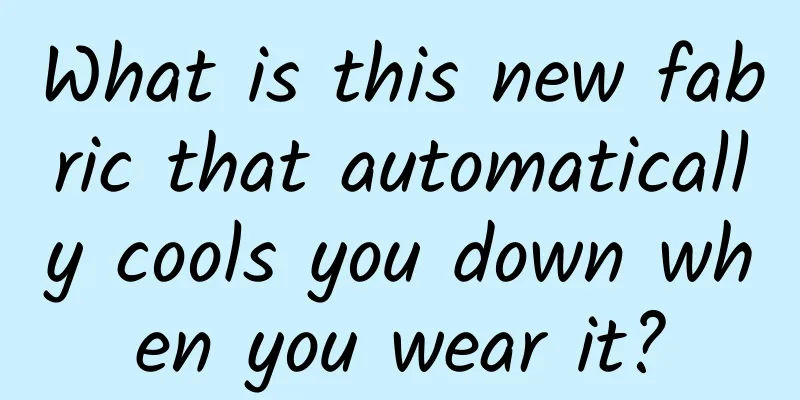It's been said that there has been no lag for 18 months, so why do you still think iOS is smoother than Android?

|
You may be a loyal fan of iOS or Android, and I believe you have also been asked this question before: which one is smoother, iOS or Android? This question has been raised with every update since the two systems were launched. Users have been arguing over which one is smoother, and it has even developed into a holy war among fans. But it turns out that the proposition of smoothness is too subjective. But most people still think that iOS is smoother. Here, let’s talk about the differences first. First of all, the organ that makes us feel the smoothness of the system is the human eye, which captures every refresh of the screen at all times, which is related to the response mechanism of the system. On iOS, the priority of system response is Touch→Media→Service→OS, which corresponds to touch→media→service→operating system. Among them, touch feedback has the highest priority response, so it can give people the characteristics of a fast response system. The response priority of Android is App→Framework→lib→Kernel, and the corresponding application→framework→system→kernel, while the screen response is at the system layer. This is why many people feel that Android is not as smooth as iOS. Another one is the graphics processor GPU, which is one of the core hardware for system smoothness. But here we are talking about the software system, and we will not mention Apple's always leading hardware for the time being. The second is the development and running environment. As we all know, Android's programming language is Java, which runs on the Dalvik virtual machine. In the early days, the 2.x version was used to seize the market, and the fluency was really not very good. But after years of optimization by Google, the rendering mechanisms of versions 3.x, 4.0, 4.1, and 5.x have changed a lot. Especially the ART mode in Android 4.4, which reduced the amount of local translation work by running the virtual machine, and greatly alleviated the lag problem. Now 6.x and 7.x are basically just patchwork. On the other side is iOS, whose programming language is Objective-C. There is nothing much to say about this. Based on Apple's closed ecosystem, there are very few models that are compatible with the iOS system, and even if there are problems, they can be solved quickly. In general, Android is now a very complete operating system, and it is not inferior to iOS in terms of fluency. But most of the time, Android is really not as good as iOS. Let's compare the fundamental differences between the two systems. Android system is open source — iOS system is closed source Android system is suitable for different types of devices - iOS system only supports its own mobile phones and tablets Android system is compatible with different external devices - iOS system only supports Apple certified devices Android devices are provided by many manufacturers - iOS devices are produced by Apple alone Have you found a problem? With so many devices compatible with Android, developers need to make trade-offs for each Android device with each system update. Although Google can optimize its own products (Nexus and Pixel series) to the extreme in adapting to the new system, this is not feasible for APP development. Every application should be compatible with more models. For Android developers, it is a headache to deal with Android devices with so many resolutions. On the contrary, iOS developers can focus on extreme optimization, because they are only compatible with a few devices, and they can do more with interactive effects. If you are careful, you will find that on King of Glory, the iOS screen with all special effects turned on will be more gorgeous than Android, and the fluency is not reduced at all. Since the Android system is open source, the quality of apps on it varies, which is also true for most Android phones. I remember that a long time ago, Keke bought an HTC G13, which was a completely unscrupulous machine (here refers to the dealer). It stuffed a lot of junk apps into the built-in ROM, resulting in the original 512MB flash memory being cut in half, and there was no way to delete them in the app. It also locked the BootLoader, so you can't fix the problem through normal flashing. In the end, although I solved it by bypassing the BootLoader and flashing the recovery, it also made me respect the Android system. Although there is no such malicious bundling in current Android phones, the disadvantages of open source are still obvious. That is, Android phones of various brands are still full of so-called customization by manufacturers, who change the phone interface randomly, give it an incomprehensible name and add OS, and make it look like a self-developed system. Some even copy the UI design of iOS, saying that it can be used for N months without lag. I almost believed it. I know that many people want to talk about iOS's pseudo background mechanism. This kind of cheating similar to hibernation is not like Android's multi-process straight background. It takes up very few resources, so it makes iOS smooth forever. Do you have anything to say about this? As a winner of Toutiao's Qingyun Plan and Baijiahao's Bai+ Plan, the 2019 Baidu Digital Author of the Year, the Baijiahao's Most Popular Author in the Technology Field, the 2019 Sogou Technology and Culture Author, and the 2021 Baijiahao Quarterly Influential Creator, he has won many awards, including the 2013 Sohu Best Industry Media Person, the 2015 China New Media Entrepreneurship Competition Beijing Third Place, the 2015 Guangmang Experience Award, the 2015 China New Media Entrepreneurship Competition Finals Third Place, and the 2018 Baidu Dynamic Annual Powerful Celebrity. |
<<: iPhone 7 global price list: Mainland and Hong Kong versions rank among the cheapest ten
>>: Apple GPU's biggest revolution in 7 years: 80% improvement, outperforming Android
Recommend
Tips for Protocol-Oriented Programming (POP) in Swift
1. Entrustment Model 1. Usage process The most co...
Understand information flow video ads and their delivery strategies in 3 minutes!
On the one hand, the professionalism of “If you h...
State Council Office: Include childbirth medical expenses in the scope of medical insurance payment reform
The General Office of the State Council recently ...
The cold wave is really coming! Temperatures in these places may drop by more than 20℃ this week, please take precautions
This weekend just ended, did you feel that summer...
The 10 most common questions for beginners learning SEO
Before reading this article, novice SEOs can revi...
Seven-part training camp: A compulsory course for short video traffic monetization, gaining huge traffic through adaptation
This course has a total of 134 complete episodes....
How much do you know about the Kitchen God who is sent to heaven during the Little New Year?
The 23rd or 24th day of the twelfth lunar month i...
Xiaohongshu KOL promotion: the secret of popular notes!
As self-media and internet celebrities became mor...
Black hat seo search engine optimization Baidu cloud download
Black hat SEO technical training, a cool black hat...
Community Operation Guide: How to double the activity?
Community is as important as socializing . People...
How to protect user privacy information? See how big companies handle it!
Let’s summarize the practices and design points o...
It may last for about 30 hours! Beijing issues orange rainstorm warning, please take precautions
Affected by the high-altitude trough and low-alti...
The longest lunar eclipse in 580 years, what would happen if you missed it?
Produced by: Hunzhi...
Protecting your liver is protecting your life! If you have a bad liver, you should avoid these 9 common foods
For some people, wine is spiritual food and a sou...









